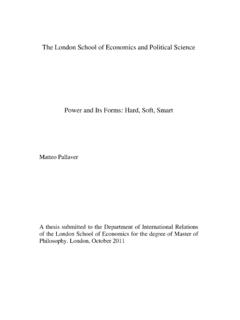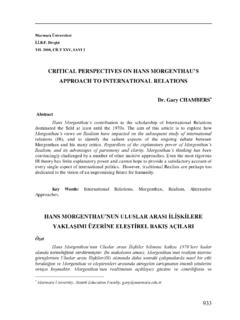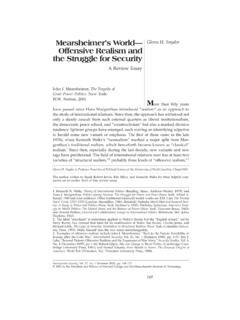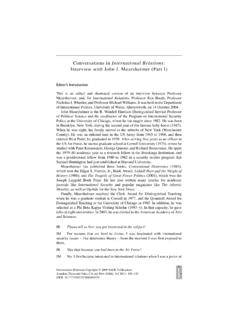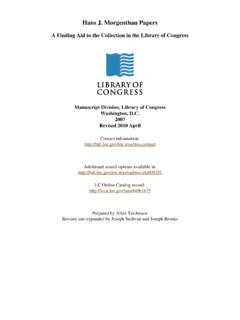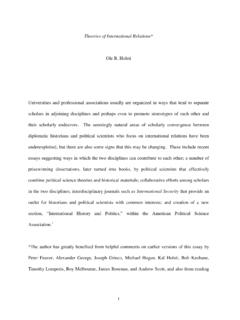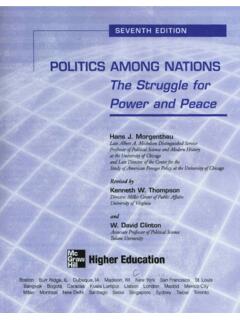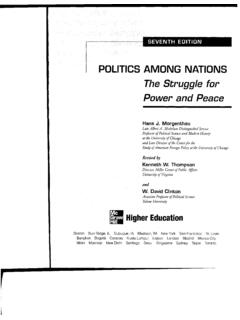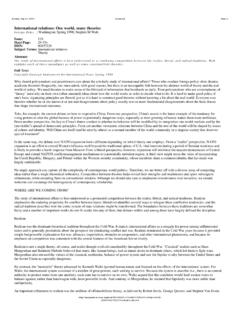Transcription of The London School of Economics and Political Science
1 1 The London School of Economics and Political Science Hans Morgenthau s Scientific Man Versus Power politics and politics among nations : A Comparative Analysis Curran Flynn A thesis submitted to the Department of International Relations of the London School of Economics for the degree of Doctor of Philosophy, London , September 2014 2 Declaration I certify that the thesis I have presented for examination for the MPhil/PhD degree of the London School of Economics and Political Science is solely my own work other than where I have clearly indicated that it is the work of others (in which case the extent of any work carried out jointly by me and any other person is clearly identified in it). The copyright of this thesis rests with the author. Quotation from it is permitted, provided that full acknowledgement is made. This thesis may not be reproduced without my prior written consent. I warrant that this authorisation does not, to the best of my belief, infringe the rights of any third party.
2 I declare that my thesis consists of 73814 words. 3 Abstract This thesis explores the discrepancies and apparent contradictions between Scientific Man Versus Power politics and politics among nations , two of Hans Morgenthau s seminal works, published in 1946 and 1948 respectively. Despite the large amount of material published on Morgenthau this discrepancy has been overlooked. Analysing these two works is achieved through the use of the Skinnerian method. To understand the purpose of the books the thesis compares each book with similar books that Morgenthau read during this period, as well as utilizing his personal correspondence to understand his motivation. The thesis argues that the tension between the works is a result of their contrasting purposes and the shift in Morgenthau s thinking wrought by changes in the external context. This external context is Morgenthau s acclimatization to US academia, the growth of the discipline of International Relations (IR) within it, and the onset of the Cold War.
3 As well as throwing light on the cogency of Morgenthau s IR contribution, the thesis illuminates the general IR literature of this period, much of which has languished under the shade of politics among nations in particular. 4 Acknowledgements A thesis is never the product of one individual. Intellectually the ideas of the author are blended with the suggestions of others. Ideas are casually adopted and modified by the author, knowingly or unknowingly, to form part of his work. Many times this influence is impossible to detect, even for the author himself. Therefore, most people I have interacted with in the last 5 years have all made a contribution to the writing of this thesis. Most notably I would like to thank my parents Colin and Sharon. Their support has been unwavering throughout this journey. The long conversations with my father helped reassure me that I was on the right track and that the process was manageable. Without them I doubt the thesis would have seen completion.
4 My partner Farina was a constant source of encouragement throughout the thesis. She endured my discussions about the topic and was understanding when I was engaged in writing. I would like to thank my supervisor Dr. Peter Wilson. His comments and encouragement were an incalculable benefit to the work. 5 Table of Contents Chapter 1 The Problem of History and Method Page 6 Chapter 2 The Analytical Approaches to the Works of Hans Morgenthau Page 35 Chapter 3 The Creation of Scientific Man Page 61 Chapter 4 politics among nations among its Contemporaries Page 83 Chapter 5 The Influence of Political Geography Page 113 Chapter 6 The Progression of Rationalism Page 150 Chapter 7 Diverging Ethics Page 179 Chapter 8 Conclusion
5 Page 227 Bibliography Page 230 6 Chapter 1 The Problem of History and Method Introduction Realism is a theory which has dominated the field of International Relations (hereafter referred to as IR) for over half a century, resulting in numerous variations and giving rise to innumerable discussions of its merits from countless Political theorists. Its leading disciple is arguably Hans Morgenthau, the preeminent American realist, whose work has garnered a recent revitalization due to a plethora of works analyzing his life and his This leads to a poignant question posed in one of these works: why does there need to be another study on Hans Morgenthau?
6 2 As with most deceptively simple questions the answer is both simple and complex. In this case the general answer is contained within the essence of the question. The simple answer is that there are issues in Morgenthau s work which have not been addressed and thus have a need for examination. The unspoken question that this answer raises is why should these issues pursued in this research be examined? The simplest answer is that as they are not answered it is a worthwhile pursuit to try and add to the sum of human knowledge. However, this does not give any answer to the question of priority, why this topic and not another? 1 See Christoph Frei, Hans J. Morgenthau: An Intellectual Biography (Baton Rouge: LSU Press, 2001) ; William E. Scheuerman, Morgenthau (Cambridge: Polity Press, 2009) ; Mihaela Neascu, Hans J. Morgenthau s Theory of International Relations: Disenchantment and Re-Enchantment (Houndmills: Palgrave Macmillan, 2010) ; Oliver Jutersonke, Morgenthau, Law and Realism (Cambridge: Cambridge University Press, 2010) ; Benjamin A.
7 Schupmann, Morgenthau mal compris: Investigating the Philosophical Roots of Hans Morgenthau s Political Realism. (Saarbrucken: Verlag Dr. Muller, 2011) ; Michael C. Williams, ed., Realism Reconsidered: The Legacy of Hans J Morgenthau in International Relations. (Oxford: Oxford University Press, 2007). 2 Jutersonke, Morgenthau, Law and Realism, Viii. 7 The more complex answer is that the refinement and understanding of Hans Morgenthau s thought is important for IR due to his theory s ubiquity. It is easily the most maligned and misunderstood theory despite the overwhelming attention that it has been given by the academic community. However, there are many articles which adequately explain his thought to those who have been indoctrinated with oversimplifications or fictitious claims. As Duncan Bell notes recent work has sought to show that realism is a sophisticated, albeit amorphous, body of Political theory that draws deep from the well of western (above all German) social and Political thought.
8 3 To add to this literature would not accomplish any meaningful ends other than reiterate a point made by others. However, once the general clarifications have been made regarding what Morgenthau s theory is, a deeper analysis of the theory is needed in order to grasp the full dimensions and intricacies of his position. There are many accounts which do this, dealing with a particular issue, analyzing his work as a whole or analyzing segments of his work in the form of an intellectual This present work differs from these in its subject matter, as it explores the discrepancies and apparent contradictions between Scientific Man Versus Power politics 5(hereafter referred to as SMPP) and politics among nations 6(hereafter referred to as PAN), two of Morgenthau s seminal works which were written in 1946 and 1948, respectively. The discrepancies that result from comparing these two pieces of work underlines a striking tension within Morgenthau s work that has not yet been adequately explored.
9 7 In analyzing these two works it will be crucial to place them in their context by identifying the purpose of the book in general and its 3 Duncan Bell, Writing the World, International Affairs 85 (2009): 6. 4 Examples of the work which deals with Morgenthau s thought in general or as part of an intellectual biography are listed above. See footnote 1. 5 Hans Morgenthau, Scientific Man Versus Power politics (Chicago: University of Chicago Press, 1946). 6 Hans Morgenthau, politics among nations : The Struggle For Power and Peace (New York: Alfred A Knopf, 1948). 7 The contrasting points between the two works will be summarized in the next chapter which will provide an outline of the thesis as well as a review on the relevant literature on Morgenthau. 8 constituent parts and what perception Morgenthau was trying to argue against. In doing this the external context of the period as well as the internal academic discourse needs to be examined to properly elucidate the reasons for these tensions.
10 Criticisms of a historical approach In order to engage upon this project it is necessary to address some general objections. In examining the past there are always criticisms that are levelled against its study. First among these is the implicit criticism in any non-historical field of whether examining the history of the discipline and its key thinkers is a worthwhile pursuit. A possible response is given by Quentin Skinner who states that the analysis of Political ideology is inescapably a historical subject and thus it is the merest parochialism to imply that this constitutes a reason for refusing to assign it the place which it clearly deserves in any academic study of politics . 8 This answer corresponds to the simple answer above, that the issue regarding Morgenthau s work is part of the discipline and as it has not been answered it is necessary to answer it. But this answer is subject to the countering criticism that historical study is the equivalent to the interest of antiquarian furniture dealers in aspects of a chair's "authenticity" or "genuineness," completely without regard for what the chair may be useful for This criticism obviously places a premium on the functional value of academic work towards the present.
